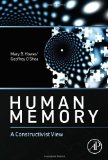new book – ‘Human Memory: A Constructivist View’ by Mary B. Howes and Geoffrey O’Shea
February 6, 2014
Human Memory: A Constructivist View by Mary B. Howes and Geoffrey O’Shea (Academic Press, 2014)
(kindle ed.), (amazon.co.uk), (UK kindle ed.)
Book description from the publisher:
While memory research has recently focused on brain images and neurological underpinnings of transmitters, Human Memory: A Constructivist View assesses how our individual identity affects what we remember, why and how. This book brings memory back to the constructivist questions of how all the experiences of an individual, up to the point of new memory input, help to determine what that person pays attention to, how that information is interpreted, and how all that ultimately affects what goes into memory and how it is stored. This also affects what can be recalled later and what kind of memory distortions are likely to occur.
The authors describe constructionist theories of memory, what they predict, how this is borne out in research findings, presenting everyday life examples for better understanding of the material and interest. Intended for memory researchers and graduate level courses, this book is an excellent summary of human memory research from the constructivist perspective.
- Defines constructivist theory in memory research
- Assesses research findings relative to constructivist predictions
- Identifies how personal experience dictates attention, interpretation, and storage
- Integrates constructivist based findings with cognitive neuroscience
Google Books preview:






